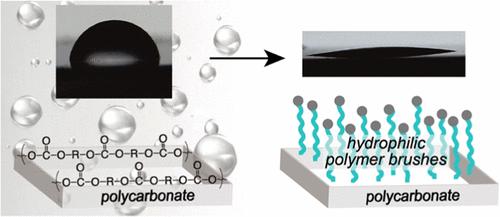当前位置:
X-MOL 学术
›
Macromolecules
›
论文详情
Our official English website, www.x-mol.net, welcomes your
feedback! (Note: you will need to create a separate account there.)
Polycarbonate Surface Modification via Aqueous SI-PET-RAFT
Macromolecules ( IF 5.1 ) Pub Date : 2022-06-10 , DOI: 10.1021/acs.macromol.2c00714 Michele Fromel 1 , Christian W. Pester 1, 2
Macromolecules ( IF 5.1 ) Pub Date : 2022-06-10 , DOI: 10.1021/acs.macromol.2c00714 Michele Fromel 1 , Christian W. Pester 1, 2
Affiliation

|
Polycarbonate (PC) is a popular consumer plastic due to its light weight, optical clarity, mechanical strength, and temperature stability. Though nontoxic and biocompatible, its inherent hydrophobicity limits its potential in applications that require hydrophilicity or use in the body. This work presents a facile method to chemically modify PC surfaces with superhydrophilic polymer brushes. A method is developed to immobilize reversible addition–fragmentation chain transfer (RAFT) agents on PC substrates. From these PC-tethered RAFT initiators, hydrophilic polymer brushes are grown under aqueous conditions, visible light, and ambient atmosphere. The resulting films decrease PC surface water contact angles (θ) to as low as θ < 10° (superhydrophilic) by continuous growth or sequential extension. This work expands the realm of possibility for uses of PC from anti-fogging lenses to durable biological devices, allowing scientists and engineers to take advantage of the many attractive physical properties of PC without limitations of hydrophobicity.
中文翻译:

通过水性 SI-PET-RAFT 进行聚碳酸酯表面改性
聚碳酸酯 (PC) 因其重量轻、光学透明度、机械强度和温度稳定性而成为一种流行的消费塑料。虽然无毒且具有生物相容性,但其固有的疏水性限制了其在需要亲水性或在体内使用的应用中的潜力。这项工作提出了一种用超亲水聚合物刷对 PC 表面进行化学改性的简便方法。开发了一种将可逆加成-断裂链转移 (RAFT) 试剂固定在 PC 基板上的方法。从这些 PC 系留的 RAFT 引发剂,亲水性聚合物刷在水性条件、可见光和环境气氛下生长。所得薄膜通过连续生长或连续延伸将 PC 表面水接触角 (θ) 降低至 θ < 10°(超亲水)。
更新日期:2022-06-10
中文翻译:

通过水性 SI-PET-RAFT 进行聚碳酸酯表面改性
聚碳酸酯 (PC) 因其重量轻、光学透明度、机械强度和温度稳定性而成为一种流行的消费塑料。虽然无毒且具有生物相容性,但其固有的疏水性限制了其在需要亲水性或在体内使用的应用中的潜力。这项工作提出了一种用超亲水聚合物刷对 PC 表面进行化学改性的简便方法。开发了一种将可逆加成-断裂链转移 (RAFT) 试剂固定在 PC 基板上的方法。从这些 PC 系留的 RAFT 引发剂,亲水性聚合物刷在水性条件、可见光和环境气氛下生长。所得薄膜通过连续生长或连续延伸将 PC 表面水接触角 (θ) 降低至 θ < 10°(超亲水)。











































 京公网安备 11010802027423号
京公网安备 11010802027423号